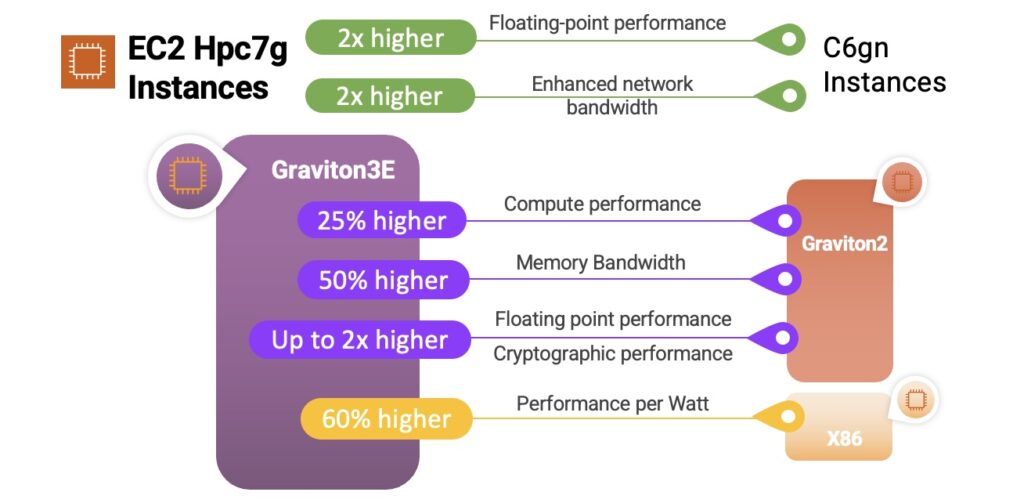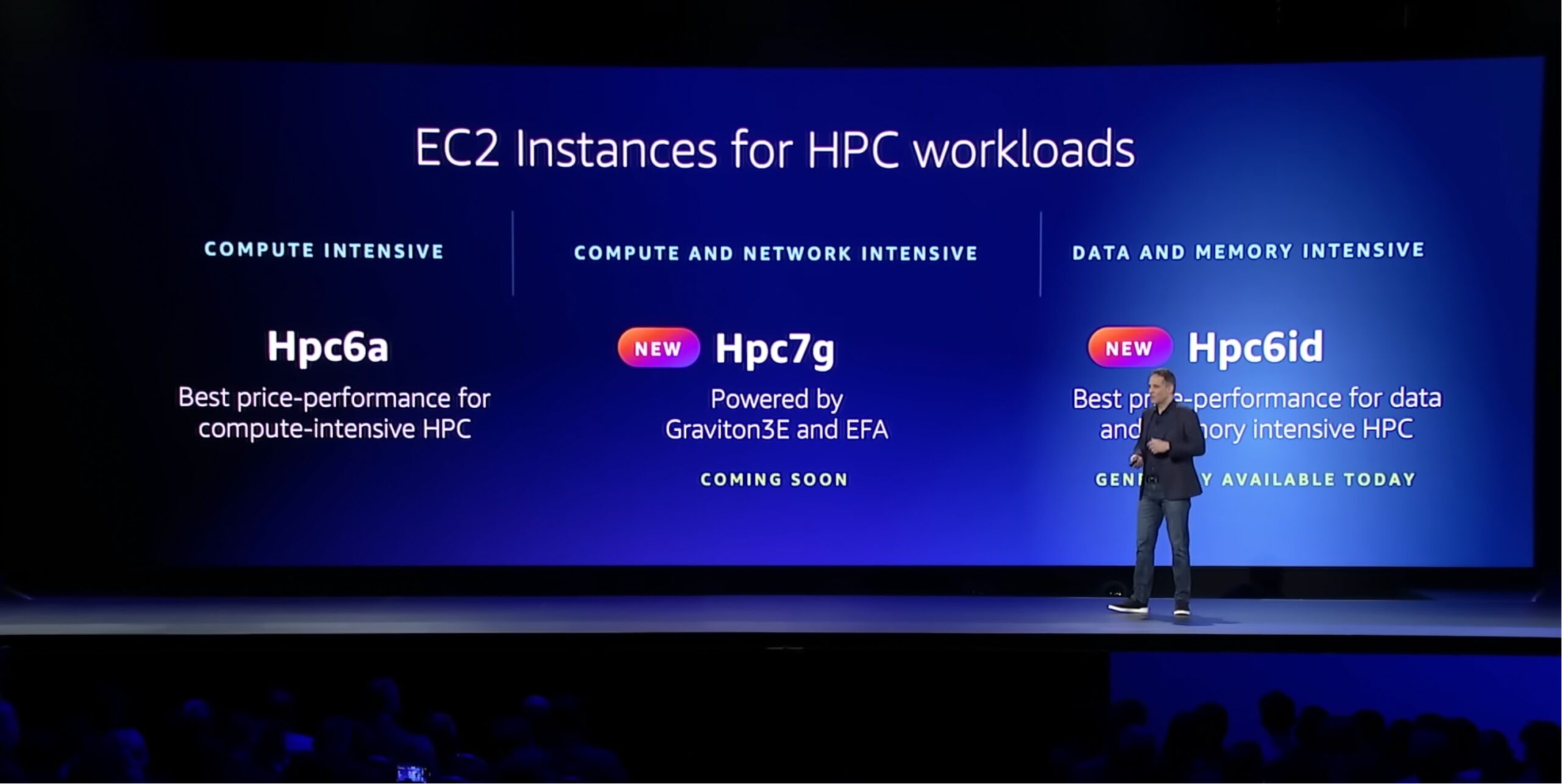The widespread availability of Amazon Elastic Compute Cloud’s Amazon EC2 Hpc7g instances has been announced by AWS. AWS Graviton processors, which are specialised Arm-based processors created by AWS, run Amazon EC2 Hpc7g instances. Simple instructions (RISC), which produce less heat and allow for better heat dissipation, are noted for their higher core counts with superior performance per watt and their energy efficiency.
Weather forecasting, computational fluid dynamics, and the pricing of financial options are examples of compute workloads. You have Amazon EC2 Hpc6a instances to aid you with this, which provide up to 65% better pricing performance compared to equivalent compute optimised x86-based instances.
Modelling the performance of complex structures, including as wind turbines, concrete buildings, and industrial machinery, is required for other HPC workloads. These models can operate inefficiently for days or weeks without enough data and memory. The Amazon EC2 Hpc6id instance features increased memory bandwidth per core, quicker local solid-state drive (SSD) storage, and improved networking using Elastic Fabric Adapter (EFA) to provide industry-leading pricing performance for data and memory-intensive HPC applications.
Amazon EC2 Hpc7g Instances
Weather forecasting, computational fluid dynamics, and the pricing of financial options are a few examples of compute-intensive HPC workloads that also call for improved network speed, price performance, and energy efficiency.
The public availability of Amazon EC2 Hpc7g instances, a new instance type created specifically for closely linked compute and network-intensive HPC applications, is being announced today.
Hpc7g instances are powered by AWS Graviton3E processors, which are up to 60% more energy-efficient than similar x86 instances and offer up to two times higher floating-point performance and 200 Gbps dedicated EFA bandwidth than EC2 C6gn instances powered by AWS Graviton2 processors.
Here is a brief infographic that compares the Graviton3E processors and HPC7g instances to earlier instances and processors:

Up to 64 cores of the most recent AWS proprietary Graviton3E CPUs with 128 GiB RAM are available in Hpc7g instances. The specifics are shown below:
| Instance Name | CPUs | RAM (GiB) | EFA Network Bandwidth (Gbps) | Attached Storage |
|---|---|---|---|---|
hpc7g.4xlarge | 16 | 128 | Up to 200 | EBS Only |
hpc7g.8xlarge | 32 | 128 | Up to 200 | EBS Only |
hpc7g.16xlarge | 64 | 128 | Up to 200 | EBS Only |
The most economical way to scale your HPC clusters on AWS is with hpc7g instances. You can take advantage of up to 200 Gbps EFA bandwidth to lower latency and run message passing interface (MPI) applications on parallel computing architectures while ensuring reduced power consumption on HPC7g instances if you’re thinking about moving your largest HPC workloads, which require tens of thousands of cores at scale, to AWS.
Utilising smaller Hpc7g instances allows you to select fewer cores while equitably allocating memory and network resources across the remaining cores to improve per-core performance and cut the cost of software licencing.
You can run different workload types within the same HPC cluster by using Hpc7g instances with AWS ParallelCluster, which offers a complete HPC run-time environment that spans both x86 and arm64 instance types. You can compare and contrast performance, making it easier to find what’s best for you and enabling easier porting of your workload.
EC2 Hpc7g Advantages
High performance
HPC7g instances are designed specifically to provide performance for closely related HPC tasks and to shorten execution and queue times throughout your HPC cluster. You may more easily get the most out of running your HPC workloads on AWS to address challenging scientific, academic, and business challenges thanks to Graviton3E processors, which have up to 35% faster vector instruction processing than Graviton3. Arm-based Graviton3E processors with up to 64 cores and 128 GiB of RAM are included in HPC7G instances.
Cost efficiency at massive scale
Even when scaling HPC clusters to tens of thousands of cores, EC2 Hpc7g instances are made to be as cost-effective as possible. Workloads including computational fluid dynamics, molecular dynamics, and numerical weather analysis may scale out almost infinitely thanks to the Elastic Fabric Adapter’s (EFA) 200 Gbps link speeds, which offer low latency and high throughput. Options for instance size assist you in controlling expenses for workloads that are licensed on a per-core basis. Regardless of the instance size you choose, you may still maximize available memory and network bandwidth by selecting the optimal number of cores per node to properly scale your workload resources.
Maximized resource efficiency
The Nitro System, a set of building pieces that transfers many of the conventional virtualization tasks to specialized hardware and software, is advantageous for HPC7g instances. High performance, high availability, and enhanced security are provided by the Nitro System.
EC2 Hpc7g Features
Powered by high-performing Graviton3E processors
Arm-based Graviton3E processors, which have 35% better floating-point performance than Graviton3-based instances, power EC2 Hpc7g instances. According to the LINPACK benchmark, Graviton3E can achieve up to two times the performance, and Life Science applications like GROMACS show a 20% increase in performance. Because HPC7g instances are available in single Availability Zones, workloads can attain the low-latency network performance required for HPC applications that require tightly linked node-to-node communication.
Highly scalable with optimizable cores per node
Comparing HPC7g instances to Graviton2 compute-optimized instances, the former provide twice as much EFA bandwidth. Hardware acceleration for HPC algorithms that solve variable-length vector math is provided by Scalable Vector Extension (SVE). SVE improves the performance and scalability of tightly connected compute-intensive HPC workloads. HPC7G instances come in a variety of instance sizes that are tailored to your particular workload by optimizing the number of cores per node. The Graviton3E processors in HPC7G instances include 16-, 32-, and 64-core configurations with 128 GiB of total memory and 8 GB/core, 4 GB/core, and 2 GB/core, respectively.
Built on the Nitro System
Because the Nitro System may be put up in a variety of ways, AWS has the freedom to create and quickly deliver EC2 instance types with an ever-expanding range of networking, storage, memory, and computing capabilities. In the end, Nitro Cards improve system performance by offloading and speeding up I/O for functions.



[…] Amazon Elastic Compute Cloud (Amazon EC2) instances powered by specialized 4th Gen Intel Xeon Scalable processors are now generally […]
[…] launched Amazon IVS support for multiple hosts in live streams in March to enable even more flexibility in […]
[…] you will need to make when it comes to hosting apps on Amazon Web Services (AWS). You may use EC2 instances, which are virtual computers, to execute your apps on AWS. They are available in different shapes […]
[…] Story of EC2 Mac Instances […]